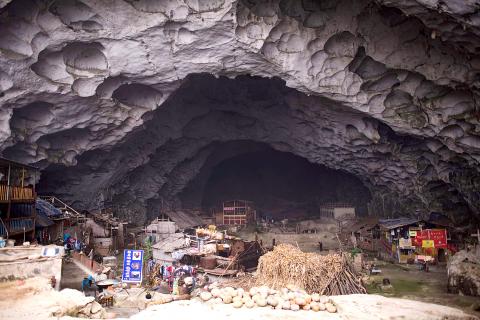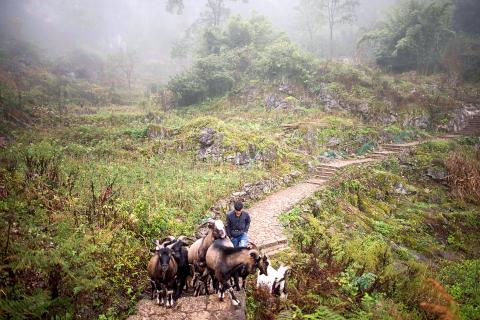High in the misty hills of southwestern China, an hour’s hike from any road, the lowing of livestock echoes through Zhongdong Village, where a group of 18 families live inside an enormous natural cave.
The final hold-outs of the nation’s “last cave-dwelling” village have had modern conveniences, such as electricity, for years. However, their only access to the outside world is a footpath winding through Guizhou Province’s rugged mountain terrain.
Now a local tourism development company has built a 15 million yuan (US$2.2 million) cable car that residents will be allowed to use for free.

Photo: AFP
The funicular will make their daily lives easier and furnish new business opportunities, the firm says.
It is to go into operation May 1. Currently, villagers must haul in all food and products that they cannot make or grow themselves — even large items like furniture — from the nearest town, a three-hour commute each way.
While some residents are excited by the economic prospects of more tourists, others are unconvinced that the new transport will improve their lives in one of China’s poorest regions.

Photo: AFP
The cable car is not convenient for the rural people of Zhongdong, since poultry and unwieldy cargo will not be allowed in cabins, 22-year-old Wang Xingguo said.
“They said they’d build us a road 15 years ago, but then they discovered this was a place they could make money off and so chose not to build it,” he said, ushering a herd of goats into a pen near the mouth of the nearly 200m deep cave.
“When authorities decide to develop a scenic spot, only they get rich,” he added.
The name Zhongdong literally translates to “middle cave,” a reference to its position between two smaller, but uninhabited caverns. Beneath the high ceiling, thatch-walled homes, piles of firewood, and domestic bric-a-brac like washing machines and bamboo posts hung with clean laundry surround a central square, fashioned into a dirt-floored basketball court.
There is no consensus as to when people first moved into the cave, but some families say they have lived there for generations. Most are of the Miao ethnic minority.
Wang’s father, Wang Hongqing, said their family moved into the cave when he was just a baby, not long after the founding of the People’s Republic of China in 1949.
The cave was previously occupied by bandits, but when the People’s Liberation Army drove them out, Wang’s family seized the opportunity to make it their home.
Twenty years ago, he became the first in Zhongdong to convert a portion of his home into a small guesthouse and now makes about 18,000 yuan (US$2,600) a year housing tourists.
New visitors brought by the cable car will make it “easier to make money,” but there are downsides, he said.
For almost a decade, the government asked villagers to move out, but Wang Hongqing refused, afraid of losing such an important supplement to his income from growing corn and raising free-range chickens.
There are concerns too that if they leave, and the area is formally incorporated into the nearby Getu River Park for paying visitors, they would be unable to return — or even visit.
“When they make this a tourist site, they’ll charge entrance fees, and I wouldn’t even be able to afford to get into the place that used to be my home,” Wang Hongqing said.
His neighbor, Wei Xiaohong, hopes the improvements will bring young people back from the cities where they have gone to find jobs.
Hundreds of millions of rural migrants have moved to urban areas since China began economic reforms in the late 1970s, hollowing out large swathes of the countryside.
The cave once housed a vibrant school with more than 200 students from the broader region — roofless, like a number of other structures inside with no need of protection from rain.
However, it was shuttered by authorities some time ago, and now Wei’s 12-year-old son must walk two hours to class.
The development firm manager, surnamed Luo, said the project would revitalize the village, gutted by the rural-to-urban migration.
Zhongdong’s houses would be repaired, the elementary school restored, and “the mess of dirty things inside” the cave cleared out, he said.
“In five years, we will have reproduced some of the original buildings and recreated the primitive life of the men out farming and the women at home doing housework for the tourists to visit,” he said.
However, a hiker visiting the cave said he would not take the cable car once it was finished, saying it “damages this place and its original style.”
The younger Wang agreed. He missed the cave while working his factory job in industrialized, prosperous Guangdong Province, where he spends most of each year, but is concerned about its future.
“We don’t live in an actual zoo, but it’s more or less the same thing,” he said, as a dozen loud tourists in athletic gear trooped in to snap selfies.
He turned back to his goats.
“I don’t dare imagine what this place will be like in the future,” he said.

The collapse of the Swiss Birch glacier serves as a chilling warning of the escalating dangers faced by communities worldwide living under the shadow of fragile ice, particularly in Asia, experts said. Footage of the collapse on Wednesday showed a huge cloud of ice and rubble hurtling down the mountainside into the hamlet of Blatten. Swiss Development Cooperation disaster risk reduction adviser Ali Neumann said that while the role of climate change in the case of Blatten “still needs to be investigated,” the wider impacts were clear on the cryosphere — the part of the world covered by frozen water. “Climate change and

Packed crowds in India celebrating their cricket team’s victory ended in a deadly stampede on Wednesday, with 11 mainly young fans crushed to death, the local state’s chief minister said. Joyous cricket fans had come out to celebrate and welcome home their heroes, Royal Challengers Bengaluru, after they beat Punjab Kings in a roller-coaster Indian Premier League (IPL) cricket final on Tuesday night. However, the euphoria of the vast crowds in the southern tech city of Bengaluru ended in disaster, with Indian Prime Minister Narendra calling it “absolutely heartrending.” Karnataka Chief Minister Siddaramaiah said most of the deceased are young, with 11 dead

Poland is set to hold a presidential runoff election today between two candidates offering starkly different visions for the country’s future. The winner would succeed Polish President Andrzej Duda, a conservative who is finishing his second and final term. The outcome would determine whether Poland embraces a nationalist populist trajectory or pivots more fully toward liberal, pro-European policies. An exit poll by Ipsos would be released when polls close today at 9pm local time, with a margin of error of plus or minus 2 percentage points. Final results are expected tomorrow. Whoever wins can be expected to either help or hinder the

DENIAL: Musk said that the ‘New York Times was lying their ass off,’ after it reported he used so much drugs that he developed bladder problems Elon Musk on Saturday denied a report that he used ketamine and other drugs extensively last year on the US presidential campaign trail. The New York Times on Friday reported that the billionaire adviser to US President Donald Trump used so much ketamine, a powerful anesthetic, that he developed bladder problems. The newspaper said the world’s richest person also took ecstasy and mushrooms, and traveled with a pill box last year, adding that it was not known whether Musk also took drugs while heading the so-called US Department of Government Efficiency (DOGE) after Trump took power in January. In a